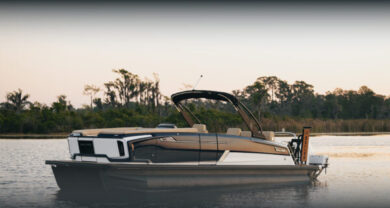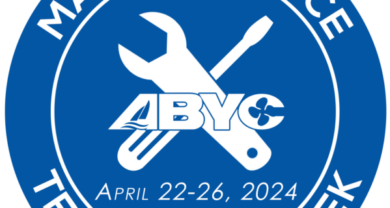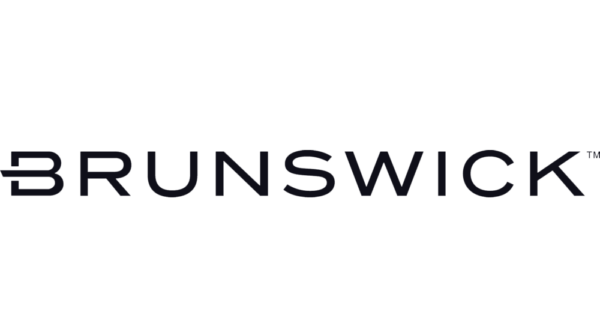Number of captive transomes rising
Larry Vandiver believes the boating industry was founded on an entrepreneurial spirit that encourages individualism.
The Suzuki executive says the sale of Genmar’s aluminum boat brands to Brunswick Corp. violates that spirit by promulgating a “cookie-cutter” approach that will only damage the marketplace.
By that, he is referring to the fact that Brunswick, which owns marine engine builder Mercury Marine, sells what Vandiver calls “captive transoms” – boat packages that include Mercury and MerCruiser product. In comparison, Genmar dealers have the ability to offer their customers a choice of engine brands, including Johnson, Evinrude, Suzuki, Yamaha, Mercury and Honda.
Brunswick says it doesn’t plan to ask its new dealers to limit the engine brands they offer in the near term. However, the company won’t divert from its long-term strategy to “envelop the dealers in goods and services from Brunswick.” The company expects this will result in growth in market share for Mercury Marine.
Consolidation: good or bad?
The boat building conglomerate believes this plan will be beneficial for the company and its dealers. Its strategy is to provide a full line of products and services to the marketplace and to use its size to focus on providing better products, faster, at a lower cost.
Vandiver, however, predicts the sale will have a negative impact on dealers, consumers and the marketplace as a whole. And the Suzuki executive isn’t the only one who has reacted to the sale.
Yamaha, in fact, has reported that it will cancel its OEM agreements with the three boat companies, effective June 30.
“From our standpoint, we don’t believe consolidation is necessarily in the best interests of the industry,” says Yamaha executive Phil Dyskow. “Certainly, if you look at the history of consolidation [in our industry], there
have been an equal number of failures
to successes.”
The three brands – Lund, Crestliner and Lowe – together make up over 30 percent of the aluminum boat market and as much as 10 percent of the overall outboard boat market, Vandiver estimates.
Almost all of the boats the brands produce are outboard boats, he says, and many of them have a kicker outboard in addition to their main power source.
Genmar Chairman Irwin Jacobs says that together, the three companies were putting about 25,000 outboard engines on the backs of their boats per year, compared to the U.S. market as a whole, which sells less than 220,000 outboard-powered boats per year.
If this is true, Yamaha motors made up slightly less than half of the three
companies’ combined annual outboard engine volume, says Dyskow. He is confident, however, that Yamaha can make up for that lost business.
“I wouldn’t have made that decision [to cancel the OEM agreements] if I didn’t think we could replace that volume with our other partners,” he states.
If indeed Yamaha is able to make up those units, it is likely to come out of the other outboard builders’ market share, setting Mercury Marine and Yamaha even farther ahead of the rest of the pack.
Dealers to be hit hardest?
Vandiver expects the sale will be hardest on the three boat companies’ dealers. Some of those dealers have “spent a lot of time, effort and money to promote” outboard engine brands other than Mercury in their marketplaces, he says. The value of that investment will be diminished or lost if they are forced to exclusively offer Mercury outboards on their aluminum boats.
In addition, many of the dealers have parts from other outboard engine brands in their inventories, which they will have to find a way to dispose of.
The dealers also may have to take on the expense of purchasing new parts and special tools specific to Mercury, as well as the time involved in training on Mercury engines, Vandiver suggests.
Dyskow says he sympathizes with the Lund, Lowe and Crestliner dealers. The decision to cancel its OEM agreements with the three companies was a difficult one, he explains.
“Past history has shown us that with every boat company Brunswick has purchased, we were eventually squeezed out,” he states. “We decided to exit on our terms rather than theirs.”
Bombardier Recreational Products, which manufacturers Johnson and Evinrude engines, has signed an agreement with Brunswick to ensure dealers’ orders are honored through June.
“Our position in the deal between Brunswick and Genmar is largely
influenced by our intent to support the dealer network,” says Roch Lambert, executive vice president, Product Development, Sales and Marketing, North America. “We are currently in discussions with Brunswick for a longer term agreement to allow our dealers to continue selling the brands that have made their dealerships what they are today.”
The sale, of course, will mean a loss of market share for several engine manufacturers eventually. However, Vandiver says the implications for the industry go much deeper than that.
“Anytime … one company dominates the industry” to such an extent, competition declines – competition on price and innovation, Vandiver points out.
This ultimately means higher prices, less product variation and fewer product choices for the consumer, he suggests.
Brunswick Boat Group’s Dusty McCoy disagrees. He points out that the industry is declining in terms of overall volume, and states that the marketplace will drive Brunswick and the industry as a whole to be more innovative and value conscious than ever before.
“The worst thing Brunswick could do is to make the investment it has and not improve [its products],” he says.
Consumers to have fewer choices
McCoy can’t deny, however, that by “enveloping” its dealers with its own
products, those dealers’ customers will have less choice when it comes to engine brands.
Of course, consumers don’t get to choose from a selection of engines when they buy a car. However, Vandiver says the boating industry differs in one major way. It’s made up of enthusiasts.
“Our average buyer has been in the market for a while,” he says. “This isn’t
his first boat, and he wants a certain type of power.”
It’s not just about two-stroke vs. four-stroke technology, he adds. It’s about the way an engine performs when a customer backs his boat in the water for the first time.
Individual choice is the “heart and soul of the marine industry,” says Vandiver. Ultimately, he believes the sale of Lund, Crestliner and Lowe to Brunswick takes away from that spirit.
— Liz Walz
BI Hot Topic Poll
In an informal poll on www.boatingindustry.com, 37.6 percent of voters said they believed brand was the most important factor for a customer when buying a boat engine, while technology finished a close second, with 33.7 percent of respondents choosing it.
That poll followed an earlier question posted to the Web site, asking respondents what they thought the verdict would be in the investigation of Japanese outboard engine dumping. Of the 739 votes cast, 300 (40.6 percent) thought the most likely outcome would be case dismissed for lack of evidence. However, all of the Japanese builders being found guilty was the next most popular answer, with 31.1 percent of the vote. — jon mohr




